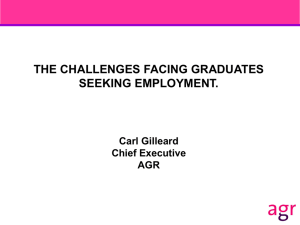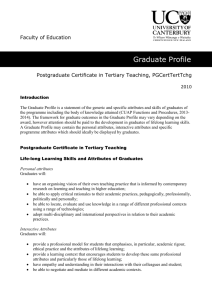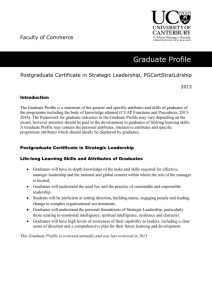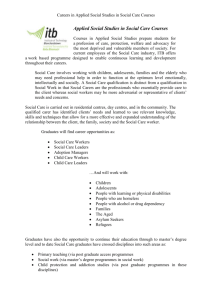Recruiting graduates - Careers & Employability
advertisement
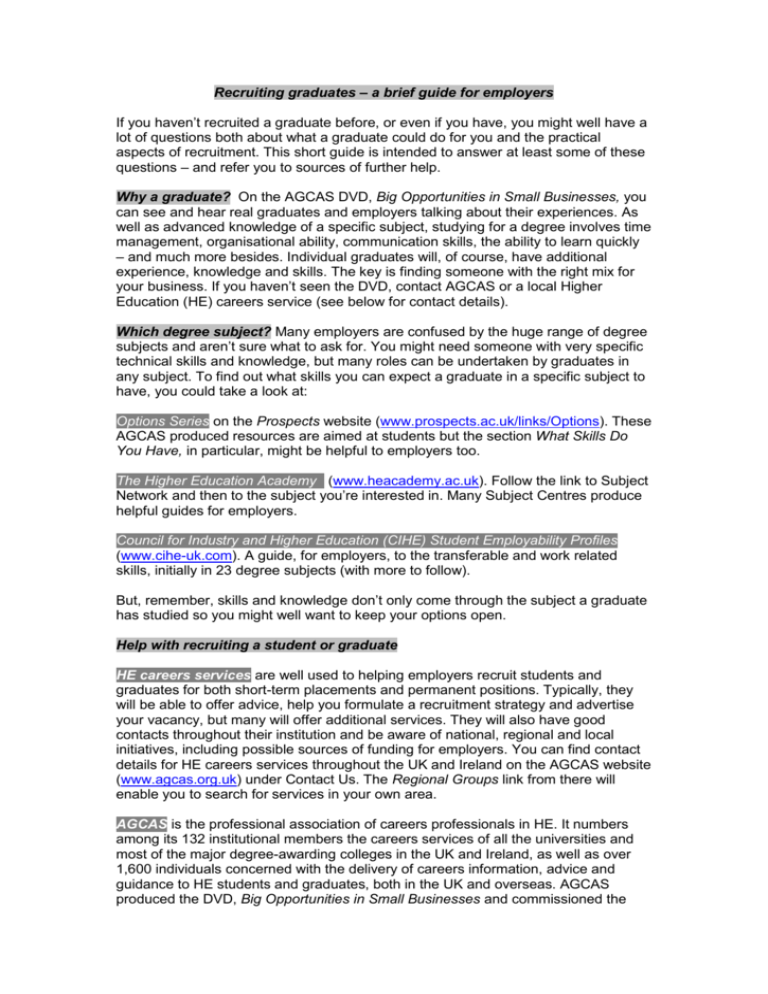
Recruiting graduates – a brief guide for employers If you haven’t recruited a graduate before, or even if you have, you might well have a lot of questions both about what a graduate could do for you and the practical aspects of recruitment. This short guide is intended to answer at least some of these questions – and refer you to sources of further help. Why a graduate? On the AGCAS DVD, Big Opportunities in Small Businesses, you can see and hear real graduates and employers talking about their experiences. As well as advanced knowledge of a specific subject, studying for a degree involves time management, organisational ability, communication skills, the ability to learn quickly – and much more besides. Individual graduates will, of course, have additional experience, knowledge and skills. The key is finding someone with the right mix for your business. If you haven’t seen the DVD, contact AGCAS or a local Higher Education (HE) careers service (see below for contact details). Which degree subject? Many employers are confused by the huge range of degree subjects and aren’t sure what to ask for. You might need someone with very specific technical skills and knowledge, but many roles can be undertaken by graduates in any subject. To find out what skills you can expect a graduate in a specific subject to have, you could take a look at: Options Series on the Prospects website (www.prospects.ac.uk/links/Options). These AGCAS produced resources are aimed at students but the section What Skills Do You Have, in particular, might be helpful to employers too. The Higher Education Academy (www.heacademy.ac.uk). Follow the link to Subject Network and then to the subject you’re interested in. Many Subject Centres produce helpful guides for employers. Council for Industry and Higher Education (CIHE) Student Employability Profiles (www.cihe-uk.com). A guide, for employers, to the transferable and work related skills, initially in 23 degree subjects (with more to follow). But, remember, skills and knowledge don’t only come through the subject a graduate has studied so you might well want to keep your options open. Help with recruiting a student or graduate HE careers services are well used to helping employers recruit students and graduates for both short-term placements and permanent positions. Typically, they will be able to offer advice, help you formulate a recruitment strategy and advertise your vacancy, but many will offer additional services. They will also have good contacts throughout their institution and be aware of national, regional and local initiatives, including possible sources of funding for employers. You can find contact details for HE careers services throughout the UK and Ireland on the AGCAS website (www.agcas.org.uk) under Contact Us. The Regional Groups link from there will enable you to search for services in your own area. AGCAS is the professional association of careers professionals in HE. It numbers among its 132 institutional members the careers services of all the universities and most of the major degree-awarding colleges in the UK and Ireland, as well as over 1,600 individuals concerned with the delivery of careers information, advice and guidance to HE students and graduates, both in the UK and overseas. AGCAS produced the DVD, Big Opportunities in Small Businesses and commissioned the Small and medium-sized enterprises (SMEs) Sector Briefing for students and graduates, as well as producing over 600 other publications, available through HE careers services and, in most cases also online on www.prospects.ac.uk. AGCAS can help companies recruit graduates, for example by supplying contact information for its member careers services on CD or labels, particularly useful if you want to advertise nationally. AGCAS also runs a number of graduate recruitment fairs in partnership with member services – and can provide information about other fairs throughout the country. Regional schemes There are many regional and local schemes that help companies recruit placement students or graduates. Some are run by Regional Development Agencies and other government bodies, others by groups of HE institutions – many by joint partnerships. Their remits vary so check out any that operate in your area. The list below is by no means exhaustive but will get you started: England North East Graduates for Business www.graduatesforbusiness.co.uk North West Graduate Futures www.staffs.ac.uk/graduatefutures Graduate into Employment Unit http://www.gieu.co.uk/for_graduates/intro.asp Yorkshire Graduate Link www.graduatelink.com Graduates Yorkshire www.graduatesyorkshire.info East Midlands Get on with Graduates www.getonwithgraduates.org.uk West Midlands Graduate Advantage www.graduateadvantage.co.uk East of England GradsEast www.gradseast.org.uk London Business Link for London www.businesslink4london.com South East Kent Grads www.kentgrads.org.uk South West Grad South West www.gradsouthwest.com Graduate Business Partnerships www.ex.ac.uk/businessprojects Northern Ireland Invest Northern Ireland http://www.investni.com Scotland Employers’ Guide to Scottish HE www.agcasscotland.org.uk/employers/guide.htm Graduates for Business www.scottish-enterprise.com/graduates Graduates for Growth www.graduatesforgrowth.co.uk/index.cfm Scottish Networks www.scottishni.org/sni/ Wales GOWales www.gowales.co.uk Prosper Recruitment www.prosperec.co.uk Graduate Prospects (www.prospects.ac.uk) is a major graduate recruitment website, run by the HE sector, and especially useful if you want to advertise directly to students and graduates nationally. It offers both online and print-based products. It can also target particular groups of students by email, including graduates of particular institutions or specific disciplines. It encompasses the National Council for Work Experience (www.work-experience.org) through which employers can obtain advice and advertise all forms of work experience. STEP (Shell Technology Enterprise Programme) (www.step.org.uk) places students into small and medium-sized companies and community organisations to undertake specific business or technical projects. Projects typically take place over eight weeks in the summer (July and August), but can also be arranged during term time, on a part-time basis or as a 12-month sandwich year. Your HE careers service should be able to put you in touch with a regional representative. Knowledge Transfer Partnerships (www.ktponline.org.uk) are designed to improve business competitiveness and productivity using the expertise of a ‘knowledge base’. You can draw on this expertise and apply it to your business via a project, lasting from one to three years. All approved Knowledge Transfer Partnerships are partfunded by the government and can enable your business to work with a university, college or research organisation that has expertise relevant to your business and can help you increase profitability. Your HE careers service should be able to put you in touch with a regional representative. Other recruitment websites, agencies and the media There are many ways to advertise your vacancy and the best choice for you will depend on a number of factors, such as the type of job, the sector in which you operate and your locality. Your local HE careers service will be able to offer advice.
